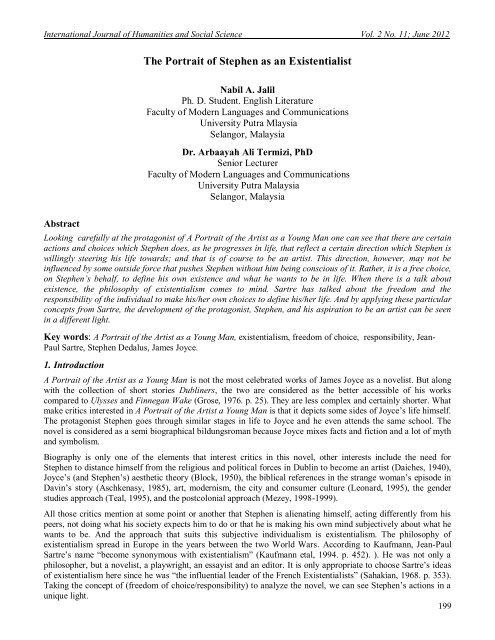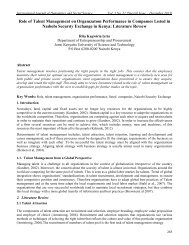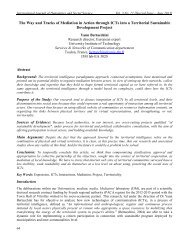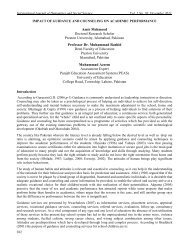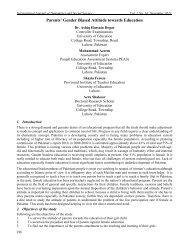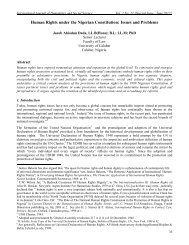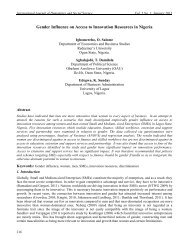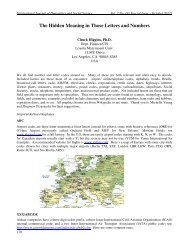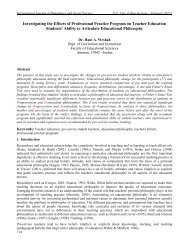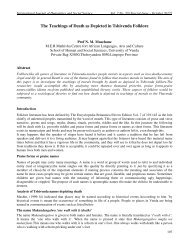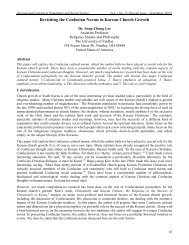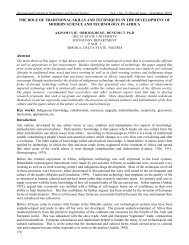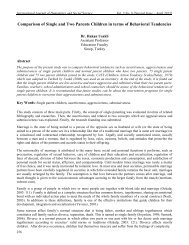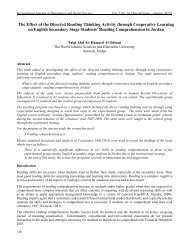The Portrait of Stephen as an Existentialist - International Journal of ...
The Portrait of Stephen as an Existentialist - International Journal of ...
The Portrait of Stephen as an Existentialist - International Journal of ...
Create successful ePaper yourself
Turn your PDF publications into a flip-book with our unique Google optimized e-Paper software.
<strong>International</strong> <strong>Journal</strong> <strong>of</strong> Hum<strong>an</strong>ities <strong>an</strong>d Social Science Vol. 2 No. 11; June 2012<br />
<strong>The</strong> <strong>Portrait</strong> <strong>of</strong> <strong>Stephen</strong> <strong>as</strong> <strong>an</strong> <strong>Existentialist</strong><br />
Nabil A. Jalil<br />
Ph. D. Student. English Literature<br />
Faculty <strong>of</strong> Modern L<strong>an</strong>guages <strong>an</strong>d Communications<br />
University Putra Mlaysia<br />
Sel<strong>an</strong>gor, Malaysia<br />
Dr. Arbaayah Ali Termizi, PhD<br />
Senior Lecturer<br />
Faculty <strong>of</strong> Modern L<strong>an</strong>guages <strong>an</strong>d Communications<br />
University Putra Malaysia<br />
Sel<strong>an</strong>gor, Malaysia<br />
Abstract<br />
Looking carefully at the protagonist <strong>of</strong> A <strong>Portrait</strong> <strong>of</strong> the Artist <strong>as</strong> a Young M<strong>an</strong> one c<strong>an</strong> see that there are certain<br />
actions <strong>an</strong>d choices which <strong>Stephen</strong> does, <strong>as</strong> he progresses in life, that reflect a certain direction which <strong>Stephen</strong> is<br />
willingly steering his life towards; <strong>an</strong>d that is <strong>of</strong> course to be <strong>an</strong> artist. This direction, however, may not be<br />
influenced by some outside force that pushes <strong>Stephen</strong> without him being conscious <strong>of</strong> it. Rather, it is a free choice,<br />
on <strong>Stephen</strong>’s behalf, to define his own existence <strong>an</strong>d what he w<strong>an</strong>ts to be in life. When there is a talk about<br />
existence, the philosophy <strong>of</strong> existentialism comes to mind. Sartre h<strong>as</strong> talked about the freedom <strong>an</strong>d the<br />
responsibility <strong>of</strong> the individual to make his/her own choices to define his/her life. And by applying these particular<br />
concepts from Sartre, the development <strong>of</strong> the protagonist, <strong>Stephen</strong>, <strong>an</strong>d his <strong>as</strong>piration to be <strong>an</strong> artist c<strong>an</strong> be seen<br />
in a different light.<br />
Key words: A <strong>Portrait</strong> <strong>of</strong> the Artist <strong>as</strong> a Young M<strong>an</strong>, existentialism, freedom <strong>of</strong> choice, responsibility, Je<strong>an</strong>-<br />
Paul Sartre, <strong>Stephen</strong> Dedalus, James Joyce.<br />
1. Introduction<br />
A <strong>Portrait</strong> <strong>of</strong> the Artist <strong>as</strong> a Young M<strong>an</strong> is not the most celebrated works <strong>of</strong> James Joyce <strong>as</strong> a novelist. But along<br />
with the collection <strong>of</strong> short stories Dubliners, the two are considered <strong>as</strong> the better accessible <strong>of</strong> his works<br />
compared to Ulysses <strong>an</strong>d Finneg<strong>an</strong> Wake (Grose, 1976. p. 25). <strong>The</strong>y are less complex <strong>an</strong>d certainly shorter. What<br />
make critics interested in A <strong>Portrait</strong> <strong>of</strong> the Artist a Young M<strong>an</strong> is that it depicts some sides <strong>of</strong> Joyce‟s life himself.<br />
<strong>The</strong> protagonist <strong>Stephen</strong> goes through similar stages in life to Joyce <strong>an</strong>d he even attends the same school. <strong>The</strong><br />
novel is considered <strong>as</strong> a semi biographical bildungsrom<strong>an</strong> because Joyce mixes facts <strong>an</strong>d fiction <strong>an</strong>d a lot <strong>of</strong> myth<br />
<strong>an</strong>d symbolism.<br />
Biography is only one <strong>of</strong> the elements that interest critics in this novel, other interests include the need for<br />
<strong>Stephen</strong> to dist<strong>an</strong>ce himself from the religious <strong>an</strong>d political forces in Dublin to become <strong>an</strong> artist (Daiches, 1940),<br />
Joyce‟s (<strong>an</strong>d <strong>Stephen</strong>‟s) aesthetic theory (Block, 1950), the biblical references in the str<strong>an</strong>ge wom<strong>an</strong>‟s episode in<br />
Davin‟s story (Aschken<strong>as</strong>y, 1985), art, modernism, the city <strong>an</strong>d consumer culture (Leonard, 1995), the gender<br />
studies approach (Teal, 1995), <strong>an</strong>d the postcolonial approach (Mezey, 1998-1999).<br />
All those critics mention at some point or <strong>an</strong>other that <strong>Stephen</strong> is alienating himself, acting differently from his<br />
peers, not doing what his society expects him to do or that he is making his own mind subjectively about what he<br />
w<strong>an</strong>ts to be. And the approach that suits this subjective individualism is existentialism. <strong>The</strong> philosophy <strong>of</strong><br />
existentialism spread in Europe in the years between the two World Wars. According to Kaufm<strong>an</strong>n, Je<strong>an</strong>-Paul<br />
Sartre‟s name “become synonymous with existentialism” (Kaufm<strong>an</strong>n etal, 1994. p. 452). ). He w<strong>as</strong> not only a<br />
philosopher, but a novelist, a playwright, <strong>an</strong> essayist <strong>an</strong>d <strong>an</strong> editor. It is only appropriate to choose Sartre‟s ide<strong>as</strong><br />
<strong>of</strong> existentialism here since he w<strong>as</strong> “the influential leader <strong>of</strong> the French <strong>Existentialist</strong>s” (Sahaki<strong>an</strong>, 1968. p. 353).<br />
Taking the concept <strong>of</strong> (freedom <strong>of</strong> choice/responsibility) to <strong>an</strong>alyze the novel, we c<strong>an</strong> see <strong>Stephen</strong>‟s actions in a<br />
unique light.<br />
199
© Centre for Promoting Ide<strong>as</strong>, USA www.ijhssnet.com<br />
2. Analysis<br />
Symbolically, Joyce weighs the choices that are available to <strong>Stephen</strong> in terms <strong>of</strong> the color <strong>of</strong> roses, "White roses<br />
<strong>an</strong>d red roses: those were beautiful colours to think <strong>of</strong> … But you could not have a green rose. But perhaps<br />
somewhere in the world you could" (Joyce, 1994. p. 12). <strong>Stephen</strong> c<strong>an</strong> choose one <strong>of</strong> two things, nationalism or<br />
religion. <strong>The</strong>se are what the two colors symbolize, the two ways by which his countrymen live, <strong>as</strong> shown during<br />
the Christm<strong>as</strong> dinner when these two choices are also represented by his father <strong>an</strong>d D<strong>an</strong>te. But <strong>Stephen</strong> is thinking<br />
<strong>of</strong> a third choice symbolized by the "green rose". He doesn't w<strong>an</strong>t to choose either this or that. He w<strong>an</strong>ts to look<br />
for other choices in life because he w<strong>an</strong>ts to be <strong>an</strong> individual person. Even though the “green rose” does not exist<br />
in Irel<strong>an</strong>d, <strong>Stephen</strong> is determined to find it somewhere else in the world. <strong>The</strong> matter <strong>of</strong> which <strong>of</strong> the available<br />
choices is brought up again when his friend <strong>as</strong>ks <strong>Stephen</strong> whether he kisses his mother or not before going to bed,<br />
<strong>Stephen</strong> wonders what choice he should make (Joyce, 1994. p. 14). It seems both <strong>of</strong> the available choices are not<br />
satisfactory neither to him nor to his society. Another symbolic reference to choices is made by the colors green<br />
<strong>an</strong>d maroon which D<strong>an</strong>te h<strong>as</strong> on her brushes "He wondered which w<strong>as</strong> right, to be for the green or for the<br />
maroon" (Joyce, 1994. p. 16-17). <strong>The</strong> matter <strong>of</strong> which way to choose in life seems limited to him because both are<br />
the choices presented by society <strong>an</strong>d they are both not his own, therefore they do not satisfy him.<br />
<strong>The</strong> choices <strong>of</strong> the two situations mentioned above give <strong>Stephen</strong> the freedom to choose. Without having a choice,<br />
a person‟s freedom is limited or there is no freedom at all. And these choices make <strong>Stephen</strong> realizes his freedom.<br />
Among the existentialists, Sartre emph<strong>as</strong>izes on freedom the most “I am indeed <strong>an</strong> existent who learns his<br />
freedom through his acts, but I am also <strong>an</strong> existent whose individual <strong>an</strong>d unique existence temporalises itself <strong>as</strong><br />
freedom, … I am condemned to be free” (qtd. in Blenkinsop, 2004. p. 162). For Sartre, whatever we do is <strong>an</strong> act<br />
that demonstrates our freedom, a freedom that we c<strong>an</strong>not evade, that is why he reaches the paradoxical conclusion<br />
that we are “condemned to be free”.<br />
So <strong>Stephen</strong> also decides to practice his freedom <strong>an</strong>d chooses not to hide behind the objective values <strong>of</strong> his peers<br />
<strong>an</strong>d the way they regard their teachers <strong>an</strong>d he decides to st<strong>an</strong>d for himself. When <strong>Stephen</strong> goes to the rector‟s<br />
room to correct the injustice he suffered on the h<strong>an</strong>d <strong>of</strong> one <strong>of</strong> his teachers, he finds his friends waiting for him<br />
<strong>an</strong>d they gather around him to cheer him for st<strong>an</strong>ding up for himself, in one <strong>of</strong> what Joyce calls "epiph<strong>an</strong>ies",<br />
which are a sudden realization or revelations at the end <strong>of</strong> each chapter, "<strong>The</strong> cheers died away in the s<strong>of</strong>t grey air.<br />
He w<strong>as</strong> alone. He w<strong>as</strong> happy <strong>an</strong>d free" (Joyce. 1994. p. 60). <strong>Stephen</strong> h<strong>as</strong> his moment <strong>an</strong>d he <strong>as</strong>serts himself in his<br />
school society <strong>as</strong> a unique character. But <strong>as</strong>ide from all that, he realizes that he alone c<strong>an</strong> do <strong>an</strong>ything to <strong>as</strong>sert his<br />
individuality. He also feels alone <strong>an</strong>d alienated from the rest <strong>of</strong> his fellows because he h<strong>as</strong> chosen to do what no<br />
one else h<strong>as</strong> done. As he realizes his loneliness, he also feels happy because he h<strong>as</strong> the choice <strong>of</strong> ch<strong>an</strong>ging <strong>an</strong>d<br />
making the suitable choices in his life. <strong>Stephen</strong> also feels free because by practicing his will, he no longer feels<br />
involved in his society or its customs, he realizes that he c<strong>an</strong> break free from what tries to shape him <strong>an</strong>d moulds<br />
him.<br />
When talking about existentialism, Sartre says that “existence comes before essence” (Sartre2001. p. 27), by<br />
which he me<strong>an</strong>s “that m<strong>an</strong> first <strong>of</strong> all exists, encounters himself, surge up in the world—<strong>an</strong>d defines himself<br />
afterwards” (Sartre, 2001. p. 28). It is not the physical existence which Sartre <strong>an</strong>d other existentialists are worried<br />
about. Nor it is the person‟s gender, colour, or social cl<strong>as</strong>s that are <strong>of</strong> interest to the existentialists. It is how a<br />
person “defines” him/herself to <strong>as</strong>sert his/her individuality. According to Sartre “M<strong>an</strong> is nothing else but that<br />
which he makes <strong>of</strong> himself” (Sartre, 2001. p. 29).<br />
This idea <strong>of</strong> existence is what occupies <strong>Stephen</strong>'s mind. He is not worried about his physical existence, nor is he<br />
worried about his physical death, "He had not died but he had faded out like a film in the sun. He had been lost or<br />
had w<strong>an</strong>dered out <strong>of</strong> existence for he no longer existed. How str<strong>an</strong>ge to think <strong>of</strong> him p<strong>as</strong>sing out <strong>of</strong> existence in<br />
such a way, not by death but by fading out in the sun or by being lost <strong>an</strong>d forgotten somewhere in the universe!”<br />
(Joyce, 1994. p. 96). He thinks <strong>of</strong> his existence in terms <strong>of</strong> making something out <strong>of</strong> his own life. He doesn't w<strong>an</strong>t<br />
to be a nobody that will "fade" away <strong>an</strong>d no one remembers, but he w<strong>an</strong>ts to exist always in the memory <strong>of</strong> the<br />
universe. <strong>The</strong> play at the school gives <strong>Stephen</strong> his first h<strong>an</strong>d experience with the t<strong>as</strong>te <strong>of</strong> art. <strong>The</strong> moment he h<strong>as</strong> a<br />
t<strong>as</strong>te <strong>of</strong> it, he c<strong>an</strong> never stop <strong>an</strong>d the only thing he would do is look for more, "Now that the play w<strong>as</strong> over his<br />
nerves cried for some further adventure. He hurried onward <strong>as</strong> if to overtake it" (Joyce, 1994. p. 88), the play<br />
showed him what he really liked <strong>an</strong>d that he is on the right way.<br />
200
<strong>International</strong> <strong>Journal</strong> <strong>of</strong> Hum<strong>an</strong>ities <strong>an</strong>d Social Science Vol. 2 No. 11; June 2012<br />
But since <strong>Stephen</strong> at this stage is still not ready to leave his prison isl<strong>an</strong>d, all that he c<strong>an</strong> do is go through the<br />
labyrinth studying it until he is ready: "He returned to his w<strong>an</strong>derings. <strong>The</strong> veiled autumnal evenings led him from<br />
street to street <strong>as</strong> they had led him years before along the quiet avenues <strong>of</strong> Blackrock" (Joyce, 1994. p. 102).<br />
In the fourth chapter, <strong>Stephen</strong> is <strong>of</strong>fered to take the order <strong>an</strong>d become a priest. He h<strong>as</strong> reached the point where he<br />
h<strong>as</strong> to make his decision. <strong>Stephen</strong> feels a kind <strong>of</strong> "chill" <strong>an</strong>d repulsion when he thinks <strong>of</strong> accepting the order, "<strong>The</strong><br />
chill <strong>an</strong>d order <strong>of</strong> the life repelled him…What had come <strong>of</strong> the pride <strong>of</strong> his spirit which had always made him<br />
conceive himself <strong>as</strong> a being apart in every order?" (Joyce, 1994. p. 164). <strong>Stephen</strong> also wonders what h<strong>as</strong> happened<br />
to his pride <strong>an</strong>d his rebellious spirit that h<strong>as</strong> been guiding him. By choosing his own path, <strong>Stephen</strong> chooses also to<br />
gain knowledge <strong>of</strong> the world through his own experience <strong>of</strong> it. He is not afraid <strong>of</strong> sinning or making mistakes<br />
because that is the way he w<strong>an</strong>ts to experience the world:<br />
He w<strong>as</strong> destined to learn his own wisdom apart from others or to learn the wisdom <strong>of</strong> others<br />
himself w<strong>an</strong>dering among the snares <strong>of</strong> the world.<br />
<strong>The</strong> snares <strong>of</strong> the world were its ways <strong>of</strong> sin. He would fall. He had not yet fallen but he would<br />
fall silently, in <strong>an</strong> inst<strong>an</strong>t. Not to fall w<strong>as</strong> too hard, too hard: <strong>an</strong>d he felt the silent lapse <strong>of</strong> his<br />
soul, <strong>as</strong> it would be at some inst<strong>an</strong>t to come, falling, falling but not yet fallen, still unfallen but<br />
about to fall. (Joyce, 1994. p. 165)<br />
Of course for the religious minded society <strong>of</strong> Irel<strong>an</strong>d at that time, if <strong>Stephen</strong> rejects taking the order he would be<br />
considered <strong>as</strong> falling, but for him it is this fall that would take him higher, though he h<strong>as</strong>n't fall yet, he will<br />
experience life <strong>as</strong> he sees it <strong>an</strong>d fall in its "snares". We see <strong>Stephen</strong>'s mind-making <strong>as</strong> he contemplates whether to<br />
take the order <strong>an</strong>d become a priest, or leave the life <strong>of</strong> religious commitment <strong>an</strong>d every involvement that comes<br />
with it behind. He goes back <strong>an</strong>d forth from the chapel, <strong>as</strong> representative <strong>of</strong> religion, <strong>an</strong>d Byron's publichouse, <strong>as</strong><br />
the name <strong>of</strong> Byron represents rebellious <strong>an</strong>d secular, artistic life:<br />
He could wait no longer…from the gate <strong>of</strong> Clontarf Chapel to the doors <strong>of</strong> Byron's publichouse<br />
<strong>an</strong>d then back again to the chapel <strong>an</strong>d the back again to the publichouse he had paced slowly at<br />
first, pl<strong>an</strong>ting his steps scrupulously in the spaces <strong>of</strong> the patchwork <strong>of</strong> the footpath, then timing<br />
their fall to the fall <strong>of</strong> verses…but he could wait no longer. (Joyce, 1994. p. 168)<br />
He reaches a decision <strong>as</strong> he finally times his steps with the fall <strong>of</strong> verses, signifying that he h<strong>as</strong> made up his mind<br />
to choose the secular artistic life over religion. At this moment <strong>Stephen</strong> h<strong>as</strong> decided his own destiny. "…the <strong>of</strong>fice<br />
he had refused…he had so <strong>of</strong>ten thought to be his destiny <strong>an</strong>d when the moment had come for him to obey he had<br />
turned <strong>as</strong>ide, obeying a wayward instinct…He had refused. Why?" (Joyce, 1994. p. 169-170). <strong>Stephen</strong> h<strong>as</strong> chosen<br />
to ch<strong>an</strong>ge the path <strong>of</strong> his life, from that which w<strong>as</strong> expected <strong>an</strong>d laid in front <strong>of</strong> him, by depending on his own<br />
“wayward instinct” because he realizes that there is no other guid<strong>an</strong>ce that he c<strong>an</strong> follow except his own. Sartre<br />
says “Thus we have neither behind us, nor before us in a luminous realm <strong>of</strong> values, <strong>an</strong>y me<strong>an</strong>s <strong>of</strong> justification or<br />
excuse” (Sartre, 2001. p. 32). <strong>The</strong>refore m<strong>an</strong> is “…forlorn. For he c<strong>an</strong>not find <strong>an</strong>ything to depend upon either<br />
within or outside himself” (Sartre, 2001.p. 32). Likewise feels <strong>Stephen</strong>, who would not be someone who would<br />
obey a value from outside his existence, he turns for himself <strong>an</strong>d his own "wayward instinct" for providing values,<br />
though he still does not have a clear idea about his path or why is he going that way.<br />
<strong>Stephen</strong> h<strong>as</strong> decided which way he would like to take in life with confidence, "He p<strong>as</strong>sed from the trembling<br />
bridge on to firm l<strong>an</strong>d again … he raised his eyes towards the slowdrifting clouds, dappled <strong>an</strong>d seaborne. <strong>The</strong>y<br />
were voyaging across the desert <strong>of</strong> the sky, a host <strong>of</strong> nomads on the march, voyaging high over Irel<strong>an</strong>d…" (Joyce,<br />
1994. p. 171). <strong>Stephen</strong> also raises his hopes high <strong>as</strong> he raises his eyes towards the sky <strong>an</strong>d imagines himself like<br />
the clouds, flying over Irel<strong>an</strong>d <strong>an</strong>d away from its labyrinth.<br />
Now that he sees his chosen path clearly, he feels that he h<strong>as</strong> come alive again, <strong>an</strong>d more import<strong>an</strong>t, he feels<br />
proud <strong>of</strong> his freedom <strong>an</strong>d his choice. He is also happy that he is alone <strong>an</strong>d t<strong>as</strong>ting the essence <strong>of</strong> life. It is his<br />
realization <strong>of</strong> his existence that makes him so close to the heart <strong>of</strong> life, <strong>as</strong> the epiph<strong>an</strong>y scene shows:<br />
<strong>an</strong>d a new life w<strong>as</strong> singing in his veins…He w<strong>as</strong> alone. He w<strong>as</strong> unheeded, happy <strong>an</strong>d near to the<br />
wild heart <strong>of</strong> life … A girl stood before him in midstream … She seemed like one whom magic had<br />
ch<strong>an</strong>ged into the likeness <strong>of</strong> a str<strong>an</strong>ge <strong>an</strong>d beautiful seabird … But her long hair w<strong>as</strong> girlish: <strong>an</strong>d<br />
girlish, <strong>an</strong>d touched with the wonder <strong>of</strong> mortal beauty, her face. (Joyce, 1994.p. 175)<br />
201
© Centre for Promoting Ide<strong>as</strong>, USA www.ijhssnet.com<br />
<strong>The</strong> girl makes him realizes that there is nothing wrong in admiring mortal beauty, <strong>as</strong> opposed to divine inhum<strong>an</strong><br />
beauty <strong>of</strong> ivory <strong>an</strong>d gold <strong>of</strong> the church. <strong>Stephen</strong> realizes that, <strong>as</strong> mortals, mortal beauty is all that we have in this<br />
world, <strong>an</strong>d we must make the best <strong>of</strong> it. Since <strong>Stephen</strong> <strong>as</strong>pires for his existence, he is not afraid to face life <strong>an</strong>d to<br />
make mistakes <strong>as</strong> he goes on through it, he knows that to experience life he must go through defeats <strong>as</strong> well <strong>as</strong><br />
victories:<br />
To live, to err, to fall, to triumph, to recreate life out <strong>of</strong> life! A wild <strong>an</strong>gel had appeared to him,<br />
the <strong>an</strong>gel <strong>of</strong> mortal youth <strong>an</strong>d beauty, <strong>an</strong> envoy from the fair courts <strong>of</strong> life, to throw open before<br />
him in <strong>an</strong> inst<strong>an</strong>t <strong>of</strong> ecst<strong>as</strong>y the gates <strong>of</strong> all the ways <strong>of</strong> error <strong>an</strong>d glory. On <strong>an</strong>d on <strong>an</strong>d on <strong>an</strong>d on!<br />
(Joyce, 1994.p. 176)<br />
Celebrating mortal beauty <strong>an</strong>d living <strong>an</strong>d accepting life with all its uncertainties, is the only way to satisfy him, <strong>as</strong><br />
hum<strong>an</strong>s c<strong>an</strong>'t achieve <strong>an</strong>y glory in life without t<strong>as</strong>ting defeat. <strong>Stephen</strong> sees himself getting nearer <strong>an</strong>d nearer to<br />
escaping the isl<strong>an</strong>d <strong>of</strong> his imprisonment, <strong>an</strong>d getting away from the others who have no will to follow their inner<br />
feelings, those who feel weary <strong>of</strong> life "…<strong>an</strong>d the tide w<strong>as</strong> flowing in f<strong>as</strong>t to the l<strong>an</strong>d with a low whisper <strong>of</strong> her<br />
waves, isl<strong>an</strong>ding a few l<strong>as</strong>t figures in dist<strong>an</strong>t pools" (Joyce, 1994. p. 176).<br />
<strong>Stephen</strong> now feels confident about his chosen path. He no longer worries about losing his way because he walks<br />
on his own. When the de<strong>an</strong> tells him that he should be careful not to lose his way, "M<strong>an</strong>y go down into the depth<br />
<strong>an</strong>d never come up. Only the trained diver c<strong>an</strong> go down into those depths <strong>an</strong>d explore them <strong>an</strong>d come to the<br />
surface again", <strong>Stephen</strong> <strong>an</strong>swers with confidence that "I need them only for my own use <strong>an</strong>d guid<strong>an</strong>ce until I have<br />
done something for myself by their light" (Joyce,1994. p. 191). He h<strong>as</strong> considered the other's guid<strong>an</strong>ce but only<br />
until he c<strong>an</strong> be ready enough to go by his own guid<strong>an</strong>ce. <strong>Stephen</strong> now c<strong>an</strong>'t st<strong>an</strong>d the city <strong>of</strong> Dublin, he feels that<br />
its weight is pulling him downwards <strong>an</strong>d preventing him from flying, "…the city's ignor<strong>an</strong>ce like a great dull<br />
stone set in a cumbrous ring, pulled his mind downward…" (Joyce, 1994. p. 183). By this stage, we see <strong>Stephen</strong> is<br />
eager to leave Dublin. He also recognizes that every one is free to choose his path in life, just <strong>as</strong> he h<strong>as</strong> chosen<br />
his, <strong>an</strong>d no one should interfere with that freedom, "You are right to go your way. Leave me to go mine" (Joyce,<br />
1994. p. 203) he tells his friends.<br />
Sartre says that “one will never be able to explain one‟s action by reference to a given <strong>an</strong>d specific hum<strong>an</strong> nature;<br />
in other words … m<strong>an</strong> is free, m<strong>an</strong> is freedom” (Sartre, 2001. p. 32). And since <strong>Stephen</strong> feels that his freedom<br />
would allow no room for <strong>an</strong>y specific or imposed “hum<strong>an</strong> nature”, he chooses to make his own nature <strong>an</strong>d to be<br />
defined <strong>as</strong> <strong>an</strong> artist. He chooses the path <strong>of</strong> art instead <strong>of</strong> the path <strong>of</strong> religion. And <strong>as</strong> <strong>an</strong> artist, <strong>Stephen</strong> appreciates<br />
the great writers since <strong>an</strong>cient times, because they all contributed to hum<strong>an</strong>ity, "<strong>The</strong> pages <strong>of</strong> his timeworn Horace<br />
never felt cold to the touch even when his own fingers were cold: they were hum<strong>an</strong> pages … but yet it wounded<br />
him to think that he would never be but a shy guest at the fe<strong>as</strong>t <strong>of</strong> the world's culture" (Joyce, 1994. p. 183), <strong>an</strong>d<br />
he <strong>as</strong>pires to make his own share <strong>of</strong> contribution towards the heritage <strong>of</strong> hum<strong>an</strong>ity. He is now starting to get<br />
recognition from others <strong>as</strong> <strong>an</strong> artist, for the first time in his life, <strong>as</strong> the de<strong>an</strong> <strong>as</strong>ks him, "You are <strong>an</strong> artist, are you,<br />
not, Mr. Dedalus?" (Joyce, 1994. p. 190). While he w<strong>as</strong> silent <strong>an</strong>d only listening to what the others say in the first<br />
chapter, we see <strong>Stephen</strong> expressing his ide<strong>as</strong> about art in this chapter <strong>an</strong>d says confidently that he is right <strong>an</strong>d the<br />
others are wrong:<br />
-We are right, he said, <strong>an</strong>d the others are wrong. To speak <strong>of</strong> these things <strong>an</strong>d to try to underst<strong>an</strong>d<br />
their nature <strong>an</strong>d, having understood it, to try slowly <strong>an</strong>d humbly <strong>an</strong>d const<strong>an</strong>tly to express …<br />
from sound <strong>an</strong>d shape <strong>an</strong>d colour which are the prison gates <strong>of</strong> our soul, <strong>an</strong> image <strong>of</strong> the beauty<br />
we have come to underst<strong>an</strong>d - that is art. (Joyce, 1994. p. 211)<br />
He is committed to his choices in life <strong>an</strong>d not afraid to voice them out whether in art or otherwise. <strong>Stephen</strong>'s<br />
description <strong>of</strong> the development <strong>of</strong> the artist's personality resembles his own development:<br />
<strong>The</strong> personality <strong>of</strong> the artist p<strong>as</strong>ses into the narrative itself, flowing round <strong>an</strong>d round the person<br />
<strong>an</strong>d the action like a vital sea … <strong>The</strong> personality <strong>of</strong> the artist, at first a cry or cadence or a mood<br />
<strong>an</strong>d then a fluid <strong>an</strong>d lambent narrative, finally refines itself out <strong>of</strong> existence, indifferent, paring<br />
his fingernails. (Joyce, 1994. p. 219)<br />
Just <strong>as</strong> <strong>Stephen</strong> had experienced both sin (when he went to the prostitute) <strong>an</strong>d religion before he found his own<br />
way, the artist must experience different <strong>as</strong>pects <strong>of</strong> life before his personality is fully developed <strong>an</strong>d detaches<br />
himself from others.<br />
202
<strong>International</strong> <strong>Journal</strong> <strong>of</strong> Hum<strong>an</strong>ities <strong>an</strong>d Social Science Vol. 2 No. 11; June 2012<br />
<strong>Stephen</strong> tells the de<strong>an</strong> that he will use the light <strong>of</strong> others to find his own way. So is the artist's personality, it must<br />
drink from the sea <strong>of</strong> life <strong>an</strong>d the experiences <strong>of</strong> other artists before it c<strong>an</strong> refine itself <strong>an</strong>d fly. Sartre says “M<strong>an</strong> is<br />
nothing else but that which he makes himself. That is the first principle <strong>of</strong> existentialism” (Sartre, 2001. p. 29).<br />
Instead <strong>of</strong> being a real priest, <strong>Stephen</strong> h<strong>as</strong> chosen to be a priest <strong>of</strong> art, "… a priest <strong>of</strong> eternal imagination,<br />
tr<strong>an</strong>smuting the daily bread <strong>of</strong> experience into the radi<strong>an</strong>t body <strong>of</strong> everliving life" (Joyce, 1994 p. 225). With his<br />
art, <strong>Stephen</strong> will tr<strong>an</strong>sform the daily experience <strong>of</strong> everyday life into a memorable, everl<strong>as</strong>ting experience.<br />
Contrary to what most people think about freedom, for Sartre “freedom” me<strong>an</strong>s also responsibility. Sartre says<br />
that “In <strong>an</strong>y c<strong>as</strong>e, <strong>an</strong>d whichever he may choose, it is impossible for him [m<strong>an</strong>]…not to take complete<br />
responsibility” (Sartre, 2001. p. 41). So here is <strong>an</strong> essential point to underst<strong>an</strong>ding Sartre‟s concept <strong>of</strong> freedom;<br />
“freedom is not the ability to obtain the ends chosen but autonomy <strong>of</strong> choices” (qtd. in Blenkinsop, 2004. p. 174).<br />
Freedom is not the reckless will to do whatever one wishes without <strong>an</strong>y responsibility. On the contrary, freedom<br />
for Sartre is to be committed for one‟s actions. Sartre goes to say that “…m<strong>an</strong> is condemned to be free.<br />
Condemned, because he did not create himself, yet is nevertheless at liberty, <strong>an</strong>d from the moment that he is<br />
thrown into this world he is responsible for everything he does” (Priest, 2001. p. 32). M<strong>an</strong> is responsible <strong>of</strong><br />
creating his own values, <strong>an</strong>d therefore he h<strong>as</strong> to be committed to what he chooses. Sartre says “In <strong>an</strong>y c<strong>as</strong>e, <strong>an</strong>d<br />
whichever he may choose, it is impossible for him…not to take complete responsibility” (Sartre, 2001. p. 41).<br />
Sartre emph<strong>as</strong>izes that there is no freedom without responsibility <strong>an</strong>d that the two are to be considered <strong>as</strong> two<br />
faces <strong>of</strong> the same coin.<br />
As <strong>an</strong> existentialist, <strong>Stephen</strong> realizes that with the freedom to choose his way <strong>of</strong> life <strong>an</strong>d the way to identify <strong>an</strong>d<br />
make himself comes commitment <strong>an</strong>d responsibility towards his chosen path that must be clear in his actions. He<br />
does not w<strong>an</strong>t to do something that he does not believe in, even if it would not harm him <strong>an</strong>d me<strong>an</strong>s the happiness<br />
<strong>of</strong> his mother for taking the E<strong>as</strong>ter duty, "I fear more th<strong>an</strong> that the chemical action which would be set up in my<br />
soul by a false homage to a symbol behind which are m<strong>as</strong>sed twenty centuries <strong>of</strong> authority <strong>an</strong>d veneration"<br />
(Joyce, 1994. p. 247). His choices come from within himself <strong>an</strong>d he doesn't yield to the wishes <strong>of</strong> others or fall<br />
under their influence to satisfy <strong>an</strong>yone even symbolically. Most import<strong>an</strong>t is that he must be true to himself before<br />
he c<strong>an</strong> be true to others.<br />
<strong>Stephen</strong> finds freedom in his alienation <strong>an</strong>d he is not afraid <strong>of</strong> being alone <strong>an</strong>d isolated from others, "I do not fear<br />
to be alone or to be spurned for <strong>an</strong>other or to leave whatever I have to leave. And I am not afraid to make a<br />
mistake, even a great mistake, a lifelong mistake <strong>an</strong>d perhaps <strong>as</strong> long <strong>as</strong> eternity too" (Joyce, 1994. p. 251). He<br />
also takes full responsibility <strong>of</strong> his actions <strong>an</strong>d mistakes, even "lifelong mistake" because that mistake would be<br />
the result <strong>of</strong> his own choice.<br />
We see from the entries in <strong>Stephen</strong>'s diary that he feels free already, "21 March, night: Free. Soulfree <strong>an</strong>d<br />
f<strong>an</strong>cyfree. Let the dead bury the dead. Ay. And let the dead marry the dead" (Joyce, 1994. p. 252). He feels alive<br />
because he is leaving behind the life <strong>of</strong> the dead in Irel<strong>an</strong>d. He is also preparing to bury the p<strong>as</strong>t <strong>an</strong>d leave every<br />
thing, even the girl <strong>of</strong> his rom<strong>an</strong>tic dreams, "She could love some cle<strong>an</strong> athlete who w<strong>as</strong>hed himself every<br />
morning to the w<strong>as</strong>te <strong>an</strong>d had black hair on his chest. Let her" (Joyce, 1994. p. 238). He is willing to leave every<br />
thing behind him <strong>an</strong>d start a new life, that is why he leaves the girl that he h<strong>as</strong> idealized for a long time because<br />
she is part <strong>of</strong> the life he h<strong>as</strong> rejected.<br />
<strong>Stephen</strong>‟s departure makes him face his loneliness, but he sees others who have chosen the road <strong>of</strong> loneliness like<br />
he did:<br />
<strong>The</strong> spell <strong>of</strong> arms <strong>an</strong>d voices: the white arms <strong>of</strong> roads, their promise <strong>of</strong> close embrace <strong>an</strong>d the<br />
black arms <strong>of</strong> tall ships that st<strong>an</strong>d against the moon, their tale <strong>of</strong> dist<strong>an</strong>t nations. <strong>The</strong>y are held out<br />
to say: We are alone. Come. And the voices say with them: We are your kinsmen. And the air is<br />
thick with their comp<strong>an</strong>y <strong>as</strong> they call to me, their kinsm<strong>an</strong>, making ready to go, shaking the wings<br />
<strong>of</strong> their exult<strong>an</strong>t <strong>an</strong>d terrible youth (Joyce, 1994. p. 257)<br />
<strong>Stephen</strong> feels that he is more related to those arms <strong>an</strong>d voices, they are his true "kinsmen", people who chose to<br />
„st<strong>an</strong>d out‟ instead <strong>of</strong> to „st<strong>an</strong>d in‟, they are the artists he chose to be one <strong>of</strong> them. <strong>The</strong> epiph<strong>an</strong>y <strong>of</strong> the l<strong>as</strong>t<br />
chapter sums up <strong>Stephen</strong>‟s attitude <strong>an</strong>d his choice <strong>of</strong> the life he w<strong>an</strong>ts. He w<strong>an</strong>ts to experience life <strong>an</strong>d art to the<br />
fullest, "So be it. Welcome, O, life! I go to encounter for the millionth time the reality <strong>of</strong> experience <strong>an</strong>d to forge<br />
in the smithy <strong>of</strong> my soul the uncreated conscious <strong>of</strong> my race.<br />
203
© Centre for Promoting Ide<strong>as</strong>, USA www.ijhssnet.com<br />
27 April: Old father, old artificer, st<strong>an</strong>d me now <strong>an</strong>d ever in good stead" (Joyce, 1994. p. 257). <strong>Stephen</strong> chooses<br />
the "race" <strong>of</strong> artists <strong>as</strong> the race that he w<strong>an</strong>ts to be identified with. <strong>The</strong> l<strong>as</strong>t sentence is addressed to his symbolic<br />
father whom he chose for guid<strong>an</strong>ce, the mythical Daedalus, to st<strong>an</strong>d by his side.<br />
3. Conclusion<br />
Sartre says that <strong>an</strong> individual is condemned to be free <strong>an</strong>d that he/she c<strong>an</strong> never evade his/her freedom. <strong>The</strong><br />
moment the individual exist in this life, he/she is faced with different choices <strong>an</strong>d the individual must practice<br />
his/her freedom to choose how to identify him/herself. For Sartre, it is the multiplicity <strong>of</strong> choices that makes the<br />
individual free, <strong>an</strong>d with this freedom comes responsibility. Because whatever the individual decides to choose, it<br />
would be his/her own choices <strong>an</strong>d therefore he/she must be responsible for them. By practicing his/her freedom,<br />
the individual defines his/her existence by choosing what he/she w<strong>an</strong>ts to be <strong>an</strong>d to what is the individual is<br />
committed to in life.<br />
<strong>Stephen</strong> may seem <strong>as</strong> a confused young m<strong>an</strong> at the beginning. However, he grows out <strong>of</strong> his confusion to emerge<br />
<strong>as</strong> a very determined individual. <strong>Stephen</strong> realizes at a young age that there are several choices in front <strong>of</strong> him,<br />
therefore, he does not have to follow in the path that h<strong>as</strong> been drawn for him by others. He starts to observe the<br />
society <strong>an</strong>d the world around him eliminating the choices that do not suit him <strong>an</strong>d focusing on the ones that he<br />
would like to be identified with. <strong>Stephen</strong> decides to take the path <strong>of</strong> art instead <strong>of</strong> the path <strong>of</strong> religion <strong>an</strong>d he<br />
consciously takes the right actions to be identified <strong>as</strong> <strong>an</strong> artist. In doing so, <strong>Stephen</strong> realizes that he h<strong>as</strong> nothing<br />
<strong>an</strong>d no one to depend on except his own subjective judgment to lead his way. And this makes him realizes that he<br />
is free do choose for himself what he w<strong>an</strong>ts to be. By practicing his freedom, <strong>Stephen</strong> chooses to be identified <strong>as</strong><br />
<strong>an</strong> artist, <strong>an</strong>d he makes the suitable choices to make himself what he w<strong>an</strong>ts to be. He also realizes that with his<br />
freedom comes a commitment towards the choices which he h<strong>as</strong> made because they are his own choices <strong>an</strong>d he is<br />
responsible for what he h<strong>as</strong> chosen. At the end, <strong>Stephen</strong> emerges <strong>as</strong> <strong>an</strong> existential character who possesses the<br />
awareness <strong>of</strong> his responsibility <strong>an</strong>d freedom to define his own existence.<br />
References<br />
Aschken<strong>as</strong>y, N. (1985). Biblical Females in a Joyce<strong>an</strong> Episode: <strong>The</strong> "Str<strong>an</strong>ge Wom<strong>an</strong>" Scene in James Joyce's "A<br />
<strong>Portrait</strong> <strong>of</strong> the Artist <strong>as</strong> a Young M<strong>an</strong>". Modern L<strong>an</strong>guage Studies, (15), 28-39.<br />
Block. H. M. (1950). <strong>The</strong> Critical <strong>The</strong>ory <strong>of</strong> James Joyce. <strong>Journal</strong> <strong>of</strong> Aesthetics <strong>an</strong>d Art Criticism, (8), 172-184.<br />
Blenkinsop, S. (2004). Choice, Dialogue <strong>an</strong>d Freedom: Towards a Philosophy <strong>of</strong> Education B<strong>as</strong>ed in<br />
Existentialism. (Unpublished Doctoral <strong>The</strong>sis). Harvard University, USA.<br />
Daiches, D. (1940). <strong>The</strong> Artist <strong>as</strong> Exile. English <strong>Journal</strong>, (29), 697-706.<br />
Gr<strong>an</strong><strong>of</strong>sky, R. (1995). "M<strong>an</strong> at <strong>an</strong> Extremity": Elemental Trauma <strong>an</strong>d Revelation in Leonard, Garry. “<strong>The</strong> City,<br />
Modernism, <strong>an</strong>d Aesthetic <strong>The</strong>ory in "A <strong>Portrait</strong> <strong>of</strong> the Artist <strong>as</strong> a Young M<strong>an</strong>". Novel: A Forum on<br />
Fiction, (29) 79-99.<br />
Grose, K. (1976). James Joyce. London: Ev<strong>an</strong>s Brothers Limited.<br />
Joyce, J. (1994). A <strong>Portrait</strong> <strong>of</strong> the Artist <strong>as</strong> a Young M<strong>an</strong>. London: Flamingo.<br />
Kaufm<strong>an</strong>n, W. & Forrest. E. B. (eds.). (1994). Philosophic Cl<strong>as</strong>sics Volume IV: Contemporary Philosophy. New<br />
Jersey: Prentice Hall.<br />
Mezey, J. H. (1998-1999). Irel<strong>an</strong>d, Europe, the World, the Universe: Political Geography in "A <strong>Portrait</strong> <strong>of</strong> the<br />
Artist <strong>as</strong> a Young M<strong>an</strong>". <strong>Journal</strong> <strong>of</strong> Modern Literature, (22) 337-348.<br />
Sahaki<strong>an</strong>, W. S. (1968). Outline-History <strong>of</strong> Philosophy. New York: Barnes & Noble, Inc.<br />
Sartre, J-P. (2001). Existentialism <strong>an</strong>d Hum<strong>an</strong>ism. In S. Priest (Ed.) Je<strong>an</strong>-Paul Sartre: B<strong>as</strong>ic Writings. (pp. 25-<br />
46). London: Routledge.<br />
Sartre, J-P. (2001). Being <strong>an</strong>d Nothingness. In S. Priest (Ed.) Je<strong>an</strong>-Paul Sartre: B<strong>as</strong>ic Writings. (pp. 194-197 &<br />
206-220) London: Routledge.<br />
Teal, L. (1995). Batlike Souls <strong>an</strong>d Penile Temptresses: Gender Inversions in "A <strong>Portrait</strong> <strong>of</strong> the Artist <strong>as</strong> a Young<br />
M<strong>an</strong>". Novel: A Forum on Fiction, 63-78.<br />
204


